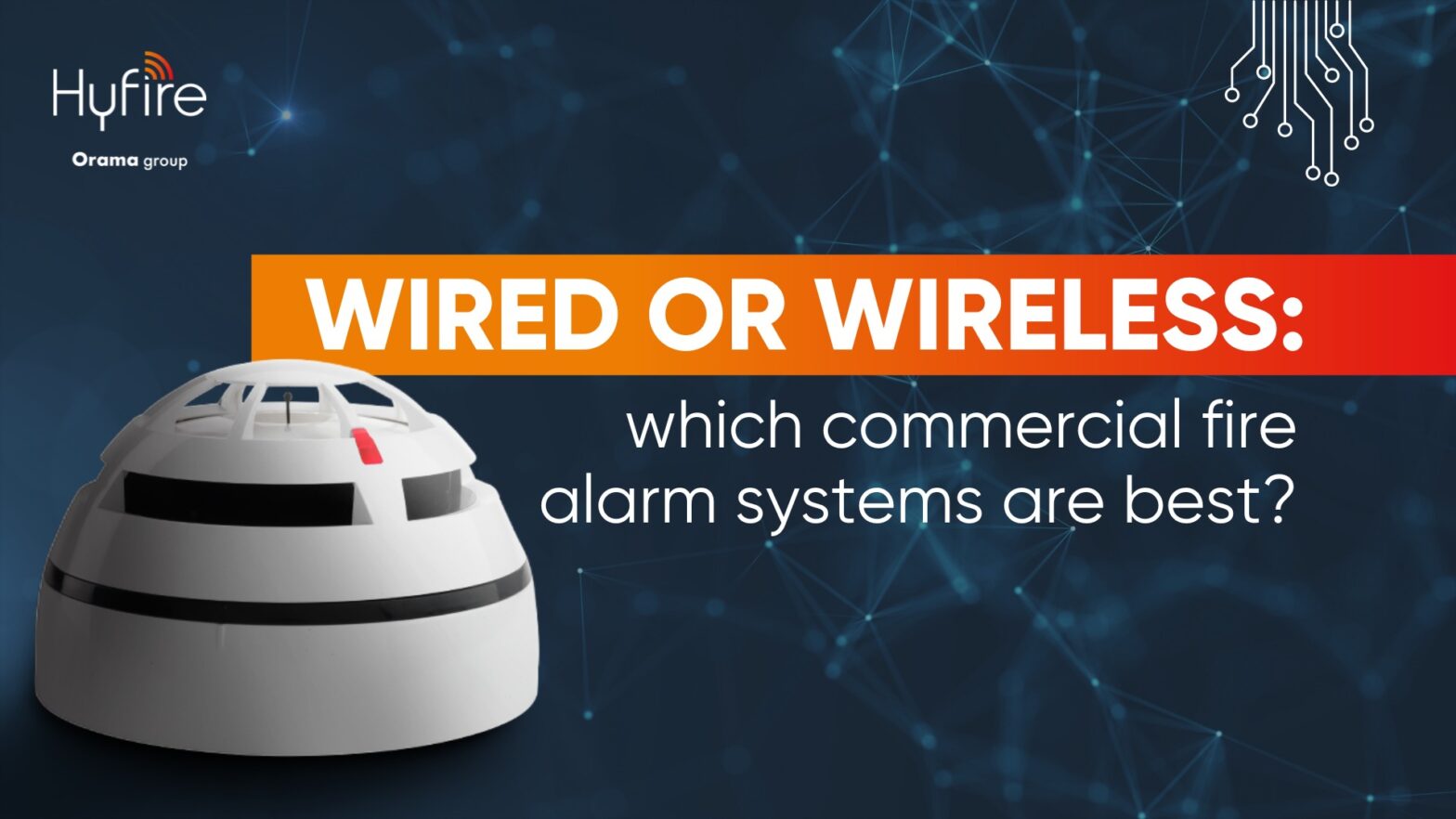Fire safety remains a paramount concern for any commercial operation. In the UK, as stated by BBC*, at least 82 towers, including London’s Grenfell Tower, have undergone material inspections and have been found to be unsafe in the event of a fire. Consequently, since 2017, the British government has decided to modify regulations, particularly for commercial fire alarm systems, to make inspections more stringent.
Selecting the most suitable fire alarm system is vital to protect human lives and preserve assets. When designing a building, whether it’s a hospital, school, or hotel, one of the critical decisions that designers and installers must make is choosing between wired and wireless systems. In this article, we will examine the advantages and disadvantages of both systems to help you determine the best fit for commercial fire alarm systems.
Advantages and Disadvantages of Wired Fire Systems
Wired fire systems have long been considered a reliable choice for commercial installations in the UK. However, with the evolution of technology, the market has embraced innovative systems that employ wireless technologies. Wired fire systems are characterised by physical cables connecting all components, such as smoke detectors, alarms, and control panels.
We’ve summarised the main advantages and disadvantages of wired systems:
- Reliability: Wired systems offer a stable and consistent connection. Installing them may require construction work, making it advisable to incorporate them during the building phase.
- Power Supply: These systems are powered directly by the building’s electrical supply, eliminating the need for battery replacements. This ensures continuous operation without concerns about battery life.On the other side, wired systems can be susceptible to physical damage to wires.
- Compatibility: Wired systems often work well with existing fire devices, but compliance with new regulations might necessitate an overall revision of the fire system.
- Installation Costs: Installing wired systems demands meticulous planning and involves higher costs due to the need for construction work, masonry, and the purchase of materials and wires. This could result in significant material waste if elements need to be relocated or repositioned.
- Limited Flexibility: Once cables are in place, effecting changes or expansions to the system can be more complex compared to wireless systems.
Advantages and Disadvantages of Wireless Fire Systems
With advancing technologies, wireless fire systems are becoming increasingly popular. Here are some key benefits:
- Ease and Speed of Installation: The absence of cables simplifies installation, reducing the required time. Installing complex fire systems can take just a few days, potentially – according to our experience- saving up to 90% of the time required by wired systems. And for hotel and hospitality environment installation and commissioning times reduced by up to 75% compared to wired systems
- Less disruption: Implementing wireless fire systems enables uninterrupted business activities within the facilities.
- Costs: Wireless devices were considered traditionally as more costly than wired alternatives because the single wired devices are cheaper than their wireless equivalents. But, eliminating the need for cable and all of the problems it can bring, installing a wireless fire system it’s faster and can be cheaper than a wired solution, with savings on refurbishment, wiring and manpower. Taking all variables into account, according to our estimation many potential savings can be achieved compared to traditional wired systems. For example it saves on staff hours through the easy and quick installation.
- Flexibility: Wireless systems offer greater flexibility in adding or removing components, adapting to evolving business needs and regulations. These systems provide reports that streamline installation and maintenance procedures.
- Aesthetics: Without the visual clutter of cables, wireless systems can be more discreet and aesthetically pleasing.
However, there are also some drawbacks associated with wireless systems:
- Batteries: Wireless fire alarm systems rely on batteries, which must be regularly checked and replaced to ensure uninterrupted functionality. The presence of batteries can pose limitations for some older type devices, while the latest technology advancements generally filled the performance gap. Advances in battery technology and LED lighting mean wireless systems can run for many years without a battery change. Our latest systems, as an example, employ lithium batteries with life spans of up to 10 years for input devices and up to 5 years for output devices.
- Range Limitations: The range between wireless devices may be limited, requiring the use of signal repeaters in larger buildings.
- Maintenance: Like many home automation products we are accustomed to, wireless fire systems require regular maintenance and monitoring,but the most advanced systems offer remote monitoring capabilities.
So which commercial fire alarm system is better to choose?
There is indeed no simple answer to the question whether wireless fire alarm systems are better than wired systems. The choice between wired and wireless fire systems depends on the specific needs of the project and the preferences of designers and installers.Both options have their pros and cons. Wired systems offer reliability and durability but can entail costs and flexibility limitations. Wireless systems, on the other hand, are easier to install and offer greater flexibility, but require more frequent maintenance for battery life-cycle and monitoring.
Thoroughly assessing the specific project needs and consulting experts in the field allows for making the right choice in an ever-advancing and innovative technological landscape. Whether opting for wired or wireless, the primary priority remains the safety and protection of people and buildings against the risk of fires.
* Source: https://www.bbc.com/news/uk-40754125
